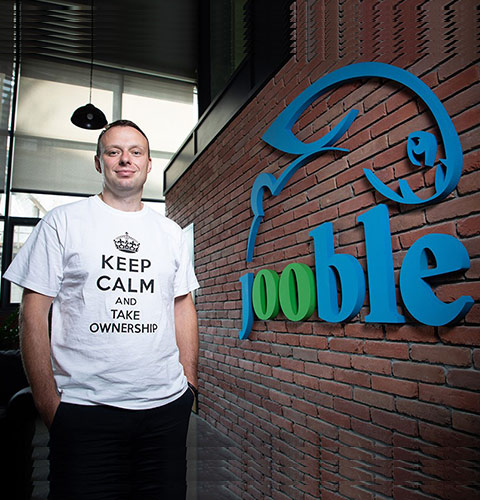The Ukrainian job search engine Jooble is currently present in 69 countries worldwide and ranks among the top 500 most visited websites globally. Jooble ranks second among job search platforms, with its main competitor, Indeed, a Japanese-American giant, outperforming it. With around 400 employees, Jooble continues to expand steadily.
Next door developers
Roman Prokofiev and Evgeniy Sobakarev, who now own Jooble, once shared a dormitory room. Their first year at the university saw them both land jobs: Zhenya at a young Ukrainian outsourcing, cutting-edge marketing firm, and Roman at a startup, Terrasoft. After that, Roman decided to create a product himself.
“I saw how the code turned into money first-hand,” Roman recalls.
Google for jobs
Students in a dorm room created the first version of Jooble without doing any market research. Sobakarev just approached Roman with the idea of building a news aggregator. After a brief pause for consideration, Roman agreed, suggesting a unique twist.
In those days, I spent far too much time finding a team member. The available services were unhelpful: poor filters, lots of duplicates, and irrelevant search results. So, I proposed the idea of creating a job search engine to Zhenya. After some thought, he agreed,” recalls Roman.
At first, they planned to name the search engine Joogle, a play on Google by taking the “J” from the word Job. It took them a year and a half to discover that a similar product already existed in the USA. The decision to name it Jooble came about only after a friend proposed delving deeper into the job’s topic.
“We came up with the concept, but our friend did the final touches,” Roman explained.
They didn’t bother with the typical business model of charging a fixed rate for posting vacancies. Instead, they opted for a pay-per-click model from direct employers. They felt the fixed-rate system needed to be more fair since it didn’t guarantee a clear return on investment. So, they made their placement free and only charged for clicks on the vacancy.
The white rabbit story
Prokofiev joked that the story of the white rabbit is a common question. But the truth is simple. One day, Zhenya returned to the dormitory at 5 a.m. with a plush toy—a white rabbit. He had been at a birthday party and loved the rabbit so much that they decided to make it the logo.
The underground traffic
To attract their first users, the students distributed printed advertisements on campuses and bought advertising in the subway stations. Before advertising, Jooble had around 200 daily organic visitors. After the ads, it jumped to about 3,000 visitors daily.
However, this number plateaued for 1.5 to 2 years, marking a challenging period for Jooble and its founders.
Tough times
Six months after starting, Jooble hit a point where expenses equal income. However, for the next two years, the company didn’t make any money; all the funds were used up.
Despite the opportunity to earn significantly more through outsourcing, Zhenya chose to develop Jooble, where he was making much less.
In 2008, Zhenya and Roman realized that Google was the key to reaching a large online audience.
“We knew if we weren’t on Google, we were invisible,” Prokofiev recalls.
The partners sought ways to get Jooble on Google, and when successful, the site’s traffic grew fourfold each year.
During the 2008-2009 crisis, Jooble faced a new challenge. The job market in Ukraine nearly came to a standstill, leaving Jooble with two options: close down completely, keep just one person to manage the server from a distance or venture into new markets.
The partners decided to take a risk and chose the second option: they first entered Russian-speaking markets, followed by Poland, and then Western European countries. And it worked!
The big story began
The successes achieved beyond Ukraine provided insights on how to scale this business.
Thanks to big data and machine learning, Jooble has become more sophisticated. In the past, search algorithms were simple, relying on keyword selection. Now, they analyze user behavior.
“When you have a large amount of data, you understand your users’ preferences, which vacancies they’ve previously viewed, and where they’ve spent more time. This allows us to provide increasingly relevant results with each search,” explains Prokofiev.
Roman and Evgeniy continue to work daily, enhancing the user experience and advancing the company.
Prokofiev highlights mobile traffic as a significant revelation for Jooble, constituting around 70% of all visits. This raises questions like how to apply for a job via mobile, given that few have resumes on their phones, and how to tailor search results better. These challenges drive continuous software updates as development never stops.
“Limitations only exist within our perceptions. We used to think our product couldn’t make it in English-speaking markets. But the UK results show otherwise. Presently, Jooble transforms every challenge into a remarkable opportunity for advancement and expansion“, says the founder.







